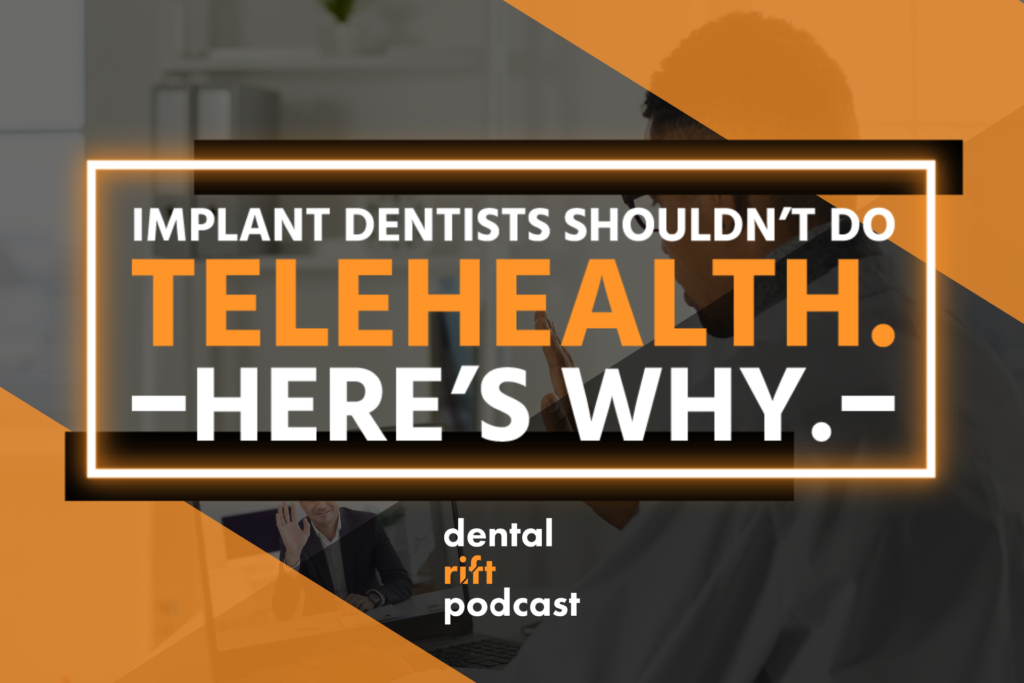We’re big fans of telehealth. If you can see a doctor without having to struggle through traffic, find a place to park, sit in a crowded waiting room, and then battle traffic again on the back end, well, that sounds good in our book.
However, while telehealth most definitely has a place in the dental world, we would caution certain dentists to think carefully before diving in. Specifically, dentists who offer high-dollar treatments with long buying cycles — implants, most of all — might lose more from embracing telehealth than they gain.
How Do Dentists Use Telehealth?
First off, let’s talk about the role that telehealth plays in dentistry. Most dental telehealth appointments are consultations — a chance to check in with a dentist or hygienist about a problem you might be having and explore your treatment options.
Now, this sort of thing works great for general dental care. If you’re feeling pain in your mouth and want to know whether you should go see your dentist in person, a quick telehealth visit will usually give you the answers you need.
Some orthodontists have also found success in offering telehealth consults. You send the dentist photos of your mouth and they can walk you through how they can improve your smile — even show you digital images of what you’d look like after treatment.
So far, so good, right?
Why Are Remote New Patient Consults a Mistake for Implant Dentists?
Here’s where telehealth gets tricky: It’s harder to build a relationship or close a deal over a screen.
Now, this isn’t an issue with general dental problems, because they tend to be both urgent and at least somewhat affordable. If you have tooth pain, are you really going to schedule telehealth consults with six different dentists before choosing which one to work with?
Nope. Unless the first dentist you talk to comes across as a complete lunatic, you’re probably going to take the first available appointment. And if you need to, you’ll put it on your credit card to pay for it.
However, this equation flips when you’re dealing with high-dollar treatments like implants.
Implants might be game changers for folks with missing teeth, but almost nobody is going to agree to get them without putting in serious, careful consideration. They cost too much not to.
A single implant-secured crown comes in at an average of $4,000. And full arch implants can set you back upwards of $50,000.
That’s an order of magnitude or two more than you’d spend getting a cavity filled — enough that even wealthier patients will take their time deciding when and with who to invest that kind of money.
Implants, in other words, operate on a different buying cycle than general dental treatment. A consult is just one step in a long process. Potential patients may take months, or even years, before they are ready to begin treatment.
This means that building relationships with those potential patients — and being able to sell them in the room — is essential for implant dentists.
But if you’re an implant dentist trying to build those relationships entirely over telehealth, then all you’re doing is making it really easy for your potential patients to window shop. They can hop off the call with you and right into a consult with another practice… and then another.
A potential patient can meet with a dozen different implant doctors and then use what they learned to pressure the closest one on price. And unless you’re that closest one, you’re out of luck.
What Should Implant Dentists Do Instead?
There’s still a role for telehealth in implant dentistry. A key part of navigating the months-long buying cycle common among implant patients is what’s called lead nurturing — continuing to check in with potential patients after an initial consultation to answer questions and build trust.
You can (and typically should) do that over the phone or Zoom. Likewise, if a patient has questions after a procedure, telehealth can be an ideal solution for a quick follow-up visit.
However, we highly recommend doing your primary implant consults in person (and figuring out how to make that feel like an easy, appealing option for your potential patients).
You’ll do a better job connecting with potential patients on a personal level and helping them to see you as not just a face on a screen, but a doctor who can help improve their lives.
Want More Full Arch Cases?
We help implant practices generate more full arch patients. Our team will:
- Connect interested implant patients with your practice
- Nurture them through the long buying cycle
- Help you get better at closing the deal
Book a chat to learn more and walk away with a FREE marketing strategy plan!


